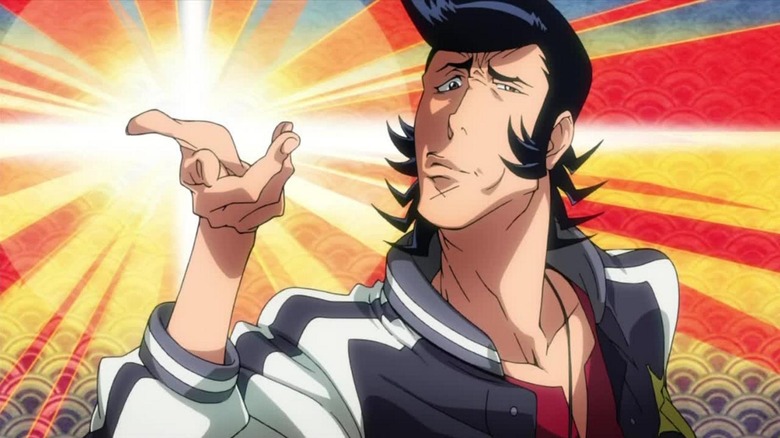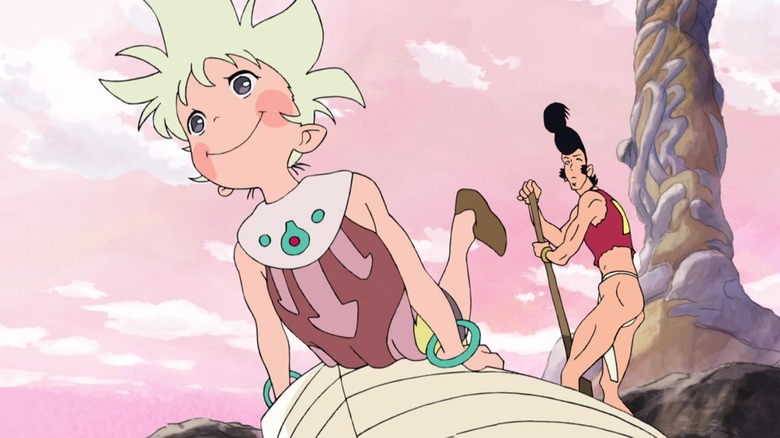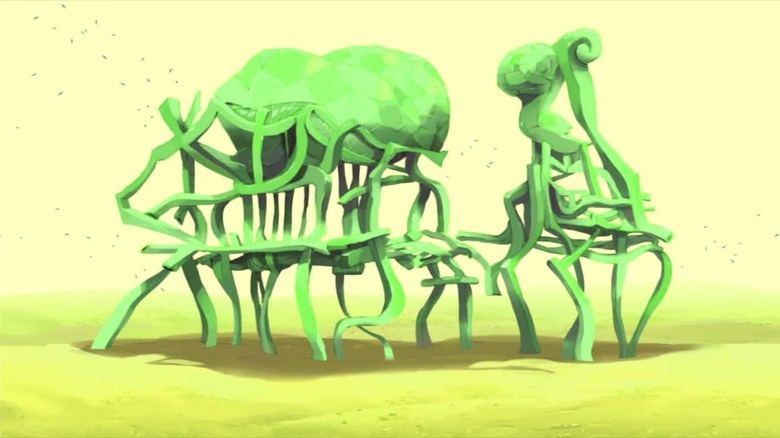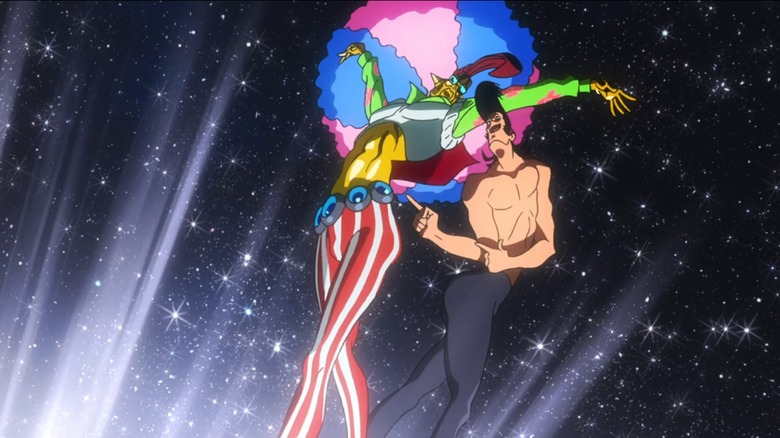The Daily Stream: Space Dandy Is A So-So Comedy But A Top-Notch Film Festival
(Welcome to The Daily Stream, an ongoing series in which the /Film team shares what they've been watching, why it's worth checking out, and where you can stream it.)
The Series: "Space Dandy"
Where You Can Stream It: Crunchyroll
The Pitch: "It's the new show by Shinichiro Watanabe." That's all people needed to get excited for "Space Dandy," a series pitched as a spiritual successor to anime classics "Cowboy Bebop" and "Samurai Champloo." "Bebop" defined the adolescence of American anime fandom with its stylish, sad storytelling on Adult Swim in 2001. Since then, the runaway success of "Attack on Titan" on streaming services in 2013 transformed anime into an international hitmaker. Popular American cartoons like "Steven Universe" borrowed from anime, and their artists would say as much in interviews. Now one of the medium's greatest producers and auteurs, after years of toil behind the scenes, was ready to blow everybody away with an all-new vision.
Such was the hype following "Space Dandy" that the first episode was reviewed in the New York Times. But while the review expressed cautious optimism, it wasn't quite a rave either. "It's...possible that Mr. Watanabe and his writers, whom worked on 'Cowboy Bebop,' aren't suited to comedy," said Mike Hale. This was, after all, a series that began with its titular character expressing his love of breasts and then traveling to a "breastaurant" called BooBies. At the end of the first episode he dies, and the next episode continues as if nothing happened. Not exactly the successor to "Cowboy Bebop" that folks wanted. But then again, as it turns out, there isn't much else quite like "Space Dandy," either.
Why it's essential viewing
"Space Dandy" is even more laid back than either "Cowboy Bebop" or "Samurai Champloo." The protagonist travels the galaxy in a Hawaii-themed spaceship called the Aloha Oe. He lives among slackers and ne'er-do-wells, including the cat-like alien Meow and a musician/secret space prince named Johnny. His nemesis Dr. Gel is a talking gorilla whose Statue of Liberty-shaped spaceship explodes at the end of most episodes. "Space Dandy" becomes increasingly comfortable with its cast over its run, even making you feel for them at times. They never quite achieve the iconicity of Spike, Jet, and Faye, no matter how hard the animators reach. But I don't think that was Watanabe's goal, to begin with.
The brilliance of "Space Dandy" is that it can be anything. Dandy's character is mutable enough that he can be repurposed in any genre, and the galaxy he inhabits transforms by the hand of each new director, writer, and animator. Whether he's escorting a young girl across space ("A Merry Companion is a Wagon in Space, Baby"), joining a rock band ("Rock 'n' Roll Dandy, Baby"), or pursuing a doomed romance with the mysterious inspector Scarlet ("Lovers are Trendy, Baby"), Dandy is never out of place. Should one episode disappoint, the next always brings something new and unexpected. Sentimentality, stoner comedy and all-out weirdness are all on the table. There's also a decipherable alien language and a sneaky ongoing plot, but you don't need to care about those things if you don't want to. It may be more fun to watch the episodes out of order these days, picking and choosing as you please.
Strange new worlds
The credits of "Space Dandy" are loaded with talented folks, both young and old. Shingo Natsume, who would go on to direct "One Punch Man" and "Sonny Boy," is credited as director under Watanabe. Animators like Bahi JD, Norifumi Kugai, and the legendary Yutaka Nakamura are all present and accounted for. But what really stands out about "Space Dandy" is its willingness to extend a hand to talents outside of the anime industry, as well as to folks within it who are rarely seen these days. Kimiko Ueno was scouted from the world of children's anime and became one of the most prolific "Space Dandy" writers. All the best comedy episodes are hers. Hard SF writer Toh Enjoe wrote two strange and fascinating episodes that make great use of Dr. Gel's scientific background (the first is titled "I'm Never Remembering You, Baby.") Eunyoung Choi, before she was fully consumed by producer duties at Science Saru, directed a fantastic episode where Dandy visits a world of plants ("Plants Are Living Things, Too, Baby.")
My two favorite episodes of the series are in the second season, which is on the whole better than the first. One is "The Big Fish is Huge, Baby," an episode that is directed, storyboarded and animated by Kiyotaka Oshiyama. Oshiyama would go on to become a high-profile creature designer for shows like "Chainsaw Man." But his work on "Space Dandy" suggests he's capable of something greater still, if the modern industry would ever allow it. Meanwhile, "A World With No Sadness, Baby" is a tour de force directed by animator Yasuhiro Nakura. It's a haunting excursion into the netherworld that is completely unlike the rest of "Space Dandy," or frankly most anime made today.
Let's dance, baby
It's tempting to call "Space Dandy" a failure. Masahiko Minami, the president of Studio Bones, said in an interview with Anime News Network that he "hoped that the audience would be a little more receptive." Toonami co-creator Jason DeMarco recently said on Twitter that Watanabe "brings it up in conversation as a big mistake on his part." But "Space Dandy" was more influential than you might think. Its director Shingo Natsume continues to release daring projects in collaboration with studios Madhouse and Science Saru. Kimiko Ueno has been writing scripts together with legendary peers Dai Sato and Kazuki Nakashima. Toh Enjoe was hired to write the high-concept "Godzilla: Singular Point." "Even Yasuhiro Nakura, who had been AWOL from the industry for years, soon after assisted Watanabe protege Sayo Yamamoto with the beautiful ending credits sequence for "Rage of Bahamut: Genesis."
"Space Dandy" was ahead of its time. It was a multiverse story before Marvel or "Everything Everywhere All at Once" committed to the bit. It's a series proudly committed to episodic adventures that aired before fans became tired of serialization or the dreaded "ten-hour movie." The creative freedom it allowed its crew of artists remains an anomaly in an anime industry where stiflingly faithful adaptations are the norm and original series are a rarity. The worst episodes of "Space Dandy" remain a fun time, and the best are entirely unique. Perhaps it was foolish on Watanabe's part to expect "Space Dandy" to hit it big with the public. But all the better for you, who now have twenty-six strange, silly, and generally wonderful animated short films at your fingertips.



